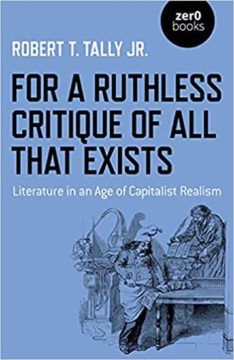 Robert Scott in the LA Review of Books:
Robert Scott in the LA Review of Books:
“IT IS EASIER to imagine the end of the world than it is to imagine the end of capitalism.” I feel ambivalent about this familiar saying, not because I disagree with it, but because it has been overused to the point of losing its force, its ability to help us grasp the devastating reality it describes. It has, in short, become a cliché, too catchy for its own good. Irritating too is the fact that the saying is nearly always quoted with reference to its apparently disputed attribution. Who came up with it first? Fredric Jameson? Slavoj Žižek? Mark Fisher? The simple — if rather boring — answer is that Jameson was paraphrased by Žižek, and then in turn both their expressions of the idea were synthesized by Fisher into the above pithy maxim describing his concept of “capitalist realism.” According to Fisher, capitalist realism is “the widespread sense that not only is capitalism the only viable political and economic system, but also that it is now impossible even to imagine a coherent alternative to it.” If we’re honest, the phrase’s source isn’t really a mystery. But worrying over its putatively enigmatic origins has given it the sheen of a proverb, reliable yet banal.
This trajectory from devastating truth to conventional wisdom may, however, encapsulate something essential to capitalist realism itself. It is apt, if tragically ironic, that the phrase that best describes what Robert Tally Jr. calls the “enervation of our imagination” of an alternative world (and ultimately of an alternative to the end of the world) should devolve into a stock phrase. In 1980, Christopher Ricks commented that “the feeling lately has been that we live in an unprecedented inescapability from clichés.” The maxim of capitalist realism — that “it is easier to imagine the end of the world than it is to imagine the end of capitalism” — both describes and has become an example of this depressing fact. Even the critique of capitalist realism risks being grasped by what it seeks to grasp: our seemingly ever-increasing inability to imagine something genuinely new or different, in spite of the apocalyptic threat posed by “all that exists.”
More here.
